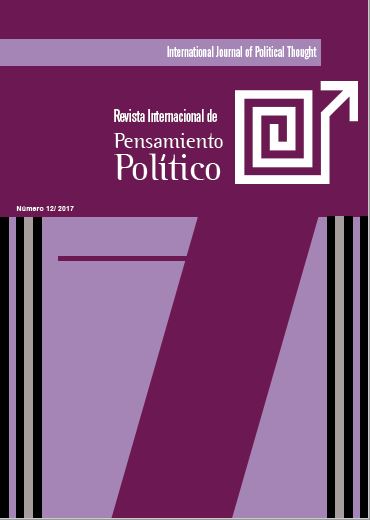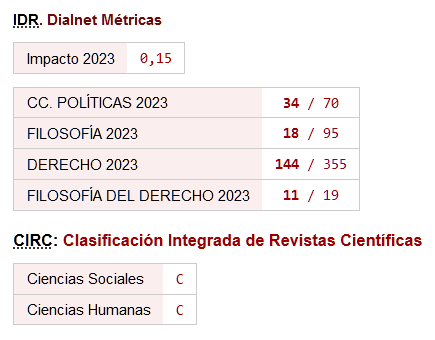Las bases afectivas del populismo
DOI:
https://doi.org/10.46661/revintpensampolit.3257Palabras clave:
esfera pública, democracia, redes sociales, afectos políticos, emociones, PopulismoResumen
Uno de los rasgos más destacados del populismo es su empleo de las emociones. Sin embargo, los análisis de la dimensión emocional del populismo suelen adolecer de cierta superficialidad. Este trabajo persigue, justamente, arrojar luz sobre las bases afectivas del populismo. A tal fin, presenta un análisis de los distintos aspectos de la afectividad populista, a partir de los hallazgos resultantes del giro afectivo experimentado por las ciencias sociales. Asimismo, se ocupa de los notables efectos que sobre la sentimentalidad populista tiene la reconfiguración digital del espacio público.Descargas
Citas
Albertazzi, D. y McDonnell, D. (2008) “Introduction: The Sceptre and the Spectre”, en D. Albertazzi y D. McDonnell (eds.), Twenty-First Century Populism. The Spectre of Western European Democracy, Houndmills, Palgrave-Macmillan, pp. 1-13.
Arias Maldonado, M. (2016) La democracia sentimental. Política y emociones en el siglo XXI, Barcelona, Página Indómita.
Arias Maldonado, M. (2017) “La digitalización de la conversación pública”, Revista de Estudios Políticos, nº 173, Julio/ Septiembre, pp. 27-54.
Baumeister, R. F. y Leary, M. R. (1995) “The need to belong: Desire for interpersonal attachments as a fundamental human motivation”. Psychological Bulletin, 117(3), pp. 497-529.
Canovan, M. (1981) Populism, Londres, Junction.
Canovan, M. (2005) The People, Cambridge, Polity.
Castells, M. (2008) Comunicación y poder, Madrid, Alianza.
Coleman, S. (2013) How voters feel, Cambridge, Cambridge University Press.
De la Torre, C. (2010) “Introduction: Power to the People? Populism, Insurrections, Democratization”, en C. De la Torre (ed.), The Promise and Perils of Populism. Global Perspectives, Lexintong, University Press of Kentucky, pp. 1-28.
Deuze, M. (2012) Media Life, Malden, Polity.
Haidt, J. (2012) The righteous mind. Why good people are divided by politics and religion, Londres y Nueva York, Penguin.
Han, B.C. (2013) Im Schwarm. Ansichten des Digitalen, Berlín, Matthes & Seitz.
Ionescu, G. y Gellner, E. (eds.) (1969) Populism, its Meanings and National Characteristics, Londres, Weidenfeld & Nicolson.
Forgas, J. P. (2000) Feeling and thinking: the role of affect in social cognition, Cambridge, Cambridge University Press.
Freeden, M. (1998) “Is Nationalism a Distinct Ideology?”, Political Studies, 46(4), pp. 748-765.
Gat, A., y Yakobson, A. (2013) Nations: The long history and deep roots of political ethnicity and nationalism, Cambridge University Press, Cambridge.
Greene, J. (2013) Moral Tribes. Emotion, reason, and the gap between us and them, Londres, Atlantic Books.
Hammack, P. y Pilecki, A. (2012) “Narrative as a Root Metaphor for Political Psychology”, Political Psychology, 33(1), pp. 75-103.
Howard, P. and Hussain, M. (2013) Democracy’s fourth wave? Digital media and the Arab Spring, New York, Oxford University Press.
Kahneman, D. (2003) “A perspective on judgement and choice: Mapping bounded rationality”, American Psychologist, 58, pp. 697-720.
Kahneman, D. (2011) Thinking, fast and slow, Londres y Nueva York, Allen Lane.
Kolbert, E. (2017) “Why facts don’t change our minds”, The New Yorker, 27 febrero 2017.
Koselleck, R. (1978) “Volk, Nation, Nationalismus, Masse”, en O. Brunner, W. Conze y R. Koselleck (eds.), Geschichtliche Grundbegriffe. Historisches Lexikon zur politisch-sozialen Sprache in Deutschland, vol. 7, Hamburgo, , Klett-Cotta, pp. 141-432.
Laclau, E. (2005) La razón populista, México DF, Fondo de Cultura Económica.
Lakoff, G. (2005) Don’t think of an elephant! Know your values and frame the debate, White River Junction, Chelsea Green Publishing.
Lassalle, J. M. (2017) Contra el populismo: cartografía de un totalitarismo posmoderno, Barcelona, Debate.
Moffit, B. (2016) The Global Rise of Populism. Performance, Political Style, and Representation, Stanford, Stanford University Press.
Moffit, B. y Tormey, S. (2014) “Rethinking Populism: Politics Mediatisation and Political Style”, Political Studies, 62, pp. 381-397.
Mouffe, C. (2000) Chantal Mouffe, The Democratic Paradox, Londres, Verso.
Mudde, C. (2004) “The populist Zeitgeist”, Government & Opposition, 39 (4), pp. 541563.
Müller, J-W. (2016) Was ist Populismus. Ein Essay, Berlín, Suhrkamp.
Neuman, W. R. (2016) The Digital Difference. Media Technology and the Theory of Communication Effectcs, Cambridge y Londres, Harvard University Press.
Ostiguy, P. (2009) “The High-Low Political Divide: Rethinking Populism and AntiPopulism”, Political Concepts: Commitee on Concepts and Methods Working Paper Series, 35.
Paasonen, S., Hillis, K., Petit, M. (2015) “Introduction: Networks of Transmission: Intensity, Sensation, Value”. In: K. Hillis et al. (eds.), Networked Affect, Cambridge and London, The Mit Press.
Panagia, D. (2009) The Political Life of Sensation, Durham, Duke University Press.
Papacharissi, Z. (2015) Affective Publics. Sentiment, Technology, and Politics, Oxford, Oxford University Press.
Pels, D. (2003) “Aesthetic Representation and Political Style: Re-balancing Identity and Difference in Media Democracy”, en J. Corner y D. Pels (eds.), Media and the Restyling of Politics, Londres, Sage, pp. 41-66.
Reese, S., Routigliano, L., Hyun, K., Jeong, J. (2007) “Mapping the Blogosphere: Professional and Citizen-based Media in the Global News Arena”, Journalism, 8(3), pp. 235-261.
Rivero, A., Zarzalejos, J., Del Palacio, J. eds. (2017) Geografía del populismo. Un viaje por el universo del populismo desde sus orígenes hasta Trump, Madrid, Tecnos.
Sandvoss, C. (2013) “Towards an understanding of political enthusiasm as media fandom: Blogging, fan productivity and affect in American Politics”, Participations. Journal of Audience & Reception Studies, 10(1), pp. 252-296.
Stanley, B. (2008) “The Thin Ideology of Populism”, Journal of Political Ideologies, 13(1), pp. 95-110.
Schechner, R. (2002) Performance studies: An introduction, New York, Routledge.
Sunstein, C. (2008) Republic.com 2.0, Princeton, Princeton University Press.
Sunstein, C. (2009): On Rumors: How Falsehoods Spread, Why We Believe Them, What Can Be Done, Nueva York, Farrar Strauss.
Taggart, P. (2000) Populism, Buckingham & Philadelphia, Open University Press.
Thompson, MN. (2016) Enough Said: What’s Gone Wrong With the Language of Politics, Londres, Bodley Head.
Thompson, S. y Hoggett, P. eds. (2012) Politics and the Emotions. The Affective Turn in Contemporary Political Studies, Londres, Continuum.
Vallespín, F. y Martínez-Bascuñán, M. (2017) Populismos, Madrid, Alianza.
Vallespín, F. (2012) La mentira os hará libres. Realidad y ficción en la democracia, Barcelona, Galaxia Gutenberg.
Van Kessel, S. (2015) Populist Parties in Europe. Agents of Discontent, Houndmills?, Palgrave Macmillan.
Villacañas, J. L. (2015) Populismo, Madrid, La Huerta Grande.
Werz, N. (2003) “Einleitung: Populismus und Populisten”, en N. Werz (ed.), Populismus: Populisten in Übersee und Europa, Leske, Leske & Budrich, pp. 7-14.
Westen, D. (2007) The Political Brain. The Role of Emotion in Deciding the Fate of a Nation, Nueva York, Public Affairs.
Weyland, K. (2001) “Clarifying a Contested Concept: Populism in the Study of Latin American Politics”, Comparative Politics, 34(1), pp. 1-22.
Worsley, P. (1969) “The Concept of Populism”, en G. Ionescu y E. Gellner (eds.), Populism, its Meanings and National Characteristics, Londres, , Weidenfeld & Nicolson pp. 212-250.
Wu, T. (2012) The Master Switch. The Rise and Fall of Information Empires, Nueva York, Alfred A. Knopf.
Descargas
Publicado
Cómo citar
Número
Sección
Licencia
Derechos de autor 2018 Revista Internacional de Pensamiento Político

Esta obra está bajo una licencia internacional Creative Commons Atribución-NoComercial-CompartirIgual 4.0.
Política de acceso abierto
Se permite el acceso libre y abierto de cualquier interesado a todos los contenidos de los números de la revista, sin costo alguno, pudiendo imprimir y trasladar todos los artículos, con la única condición de precisar la fuente y la autoría.
La revista: a) no cobra a las autorías costes por el procesamiento de los artículos ni por el envío de los mismos, b) mantiene el copyright para los autores sin restricciones, c) facilita a los autores conservar sus derechos de publicación sin limitaciones.
La Revista Internacional de Pensamiento Político es una obra original del Laboratorio de Ideas y Prácticas Políticas de la Universidad Pablo de Olavide. Todos los artículos incluidos en la Revista son obra original de sus respectivas autorías. Esta Revista se ofrece libremente a la comunidad científica y académica sin coste alguno y libera los contenidos de acuerdo a la licencia "Reconocimiento-NoComercial-CompartirIgual 4.0 CC BY-NC-SA" del proyecto Creative Commons dispuesta en la siguiente url: https://creativecommons.org/licenses/by-nc-sa/4.0/legalcode
Si deseas traducir o compilar alguno de los artículos aquí disponibles, por favor, ponte en contacto













